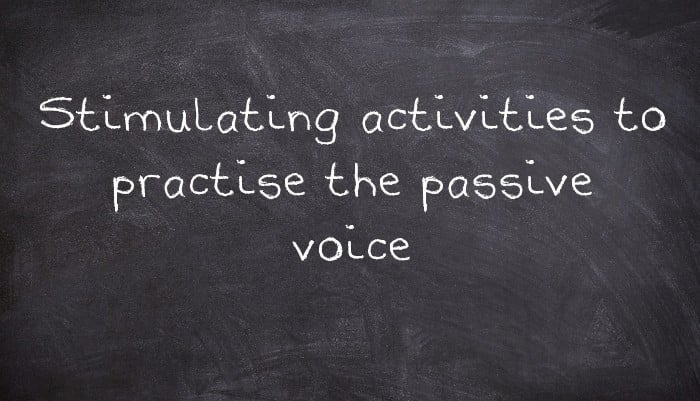Passives like “are made” and “was killed” are fairly easy to understand and produce in writing, but less common in speaking and less easy to connect to that skill. This article therefore gives some mainly oral classroom practice ideas. In most games below you have the choice between using just passives (probably in a range of tenses to make it worthwhile) or a mix of active and passive forms. Please note that not all the general knowledge example sentences below have been fact checked!
Topics which are likely to bring up lots of passive forms include:
- Inventions (“It was made possible by the invention of bendable steel, which had been developed around 20 years earlier”)
- Descriptions of countries (“Half the world’s watermelons are grown there”)
- Descriptions of products and raw materials (“It was first grown in the Middle East”)
- Stories of companies (“It was founded by…”)
- Crimes and punishments (“He was seen entering the building at seven pm”)
- Disasters (e.g. travel disasters like “I was bitten by an alligator” and hard luck childhood stories like “I was sold by my parents”)
Guess from passives
The obvious thing to do with the topics above is for students to guess which country, invention, company, product etc is being described. To put more dynamic practice of the grammar into that, they could try to remember the passive forms that were used in the description after guessing, or have to put the correct verb forms into the texts before guessing.
Matching passives
A related activity to Guess From Passives above is split sentences describing different places, things etc that students should put together through grammatical and factual clues, e.g. “Tokyo Tower was specifically” “built to be taller than the Eiffel Tower” and “More cheese is” “eaten in France than in any other country”. This can also be set up as dominoes or a kind of jigsaw to make it easier to do and more fun.
You can also play the memory card game pelmanism with split passive sentences, but in this case it is probably better to set it up so that many different matches are possible as otherwise it could take ten minutes before they finally find the cards to make up the true sentence “Most olive oil sold by Italian companies is” “made in Spain”.
Guessing passives
Students guess whether the passive or active sentence is true for things like “Mr Bean” “bite” “dog” and “Elephant” “scare” “mouse”, then watch, read, listen or ask the teacher to check.
Passives sentence completion guessing game
Students complete at least half of the sentence stems they have been given such as “I was _______________ at school” and “I have been ______________ by a dog” with true personal information. They read out just the part they read, e.g. “peed on”, and their partner tries to guess which gap that goes in.
Passives sentence completion bluff
The sentence stems mentioned in Passives Sentence Completion Guessing Game above can also be used in a bluffing game, with students filling half the gaps with false information. They read out one of the sentences and their partner tries to work out if it’s true or not, perhaps after asking follow up questions like “Where did it happen?” and “How did you react?”
Passives stories
Students try to make a story with as many passives in as possible, perhaps with the help of pieces of paper with verbs which are often passive such as “break” and “attack”. This can also be made more fun by getting them to start alternate sentences of the story with “Fortunately,…” and “Unfortunately,…”
Passives sentence expansion
Students take turns trying to expand a short passive sentence like “I was robbed”, e.g. to “I was robbed of my clothes” then “I was robbed of all my clothes by a monkey”, etc. They can’t change what their partner said, only add ideas. If anyone gives up or forgets the previous sentence, the other person wins that round and they can move onto the next round with another short passive sentence like “I am often criticised”.
